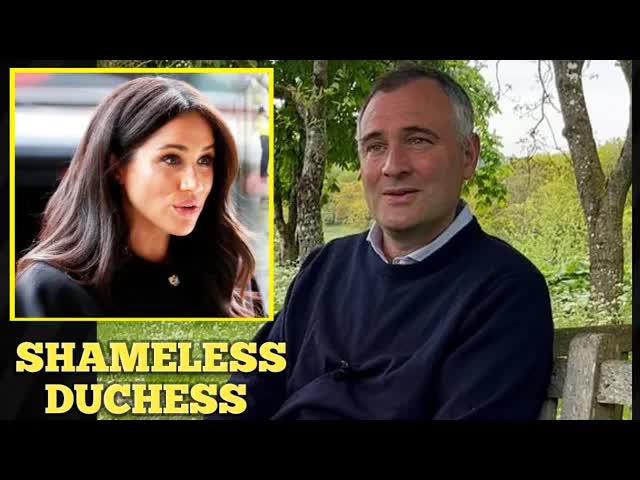The News
Meghan Markle: The Celebrity Who Sparks Controversy and Conversation
In the realm of celebrity news, few names ignite as much debate as Meghan Markle.
Since her marriage to Prince Harry, the former Duchess of Sussex has been under relentless media scrutiny.
She's become a lightning rod for discussions about race, privilege, and the complexities of public perception.
As a biracial woman navigating predominantly white spaces, Markle embodies both empowerment and, according to some critics, manipulation.
Recently, British socialite Ben Goldsmith stirred the pot by publicly accusing Markle of manipulative behavior and bullying tendencies.
His remarks came during a broader discussion about the implications of her actions, particularly within the black community.
Goldsmith's assertion that even some black individuals see through her narrative struck a chord with many followers.
This sentiment reflects a growing discontent among those who once supported Markle, suggesting that her story may not resonate with the realities faced by all.
As the conversation around Markle intensified, she reportedly reacted with frustration and anger towards Goldsmith's comments.
This response highlights her sensitivity to criticism and the challenges she faces in maintaining her public image.
Critics argue that her approach often feels like a performance—an artfully constructed narrative aimed at garnering sympathy while avoiding accountability for her actions.
Goldsmith's critique resonates with a wider skepticism emerging among some black voices regarding Markle's authenticity and intentions.
This skepticism isn't just a personal attack; it calls for greater authenticity and responsibility from public figures who advocate for social justice.
The dialogue surrounding Markle isn't just about her; it's a reflection of larger societal issues involving race, privilege, and the responsibilities that come with a platform.
As this discourse unfolds, it raises essential questions about celebrity culture.
Can someone like Markle genuinely advocate for marginalized communities while enjoying the privileges of her celebrity status?
Opinions vary widely, with some seeing her as an authentic advocate, while others view her through a more critical lens.
For many, Goldsmith's remarks serve as a catalyst for re-evaluating how public figures engage with race and representation.
In the wake of his comments, Markle's supporters quickly rallied to her defense, emphasizing her advocacy efforts and the positive changes she has inspired.
However, this support was met with counterarguments questioning the effectiveness of her activism when viewed alongside her personal privileges.
The debate transcends Markle herself, reflecting a broader cultural conversation about accountability and the intersection of race and privilege.
As we analyze this ongoing saga, it becomes clear that public perception of Markle intertwines with deeper societal issues.
The discussions ignited by Goldsmith's remarks shine a light on the complexities of identity and representation today.
It prompts us to reflect on our biases and the narratives we consume, making Markle's journey a mirror for many navigating similar intersections of race and privilege.
The unfolding drama between Meghan Markle and Ben Goldsmith encapsulates a moment of reckoning.
It underscores the need for a nuanced understanding of race, privilege, and authenticity in public discourse.
As this narrative continues to evolve, it's crucial to approach it with an open mind, acknowledging the diverse perspectives that shape our understanding of these intricate issues.
Markle's experiences as a biracial woman often place her at the crossroads of race and celebrity culture.
Her past as an American actress and her role as a member of the British royal family have subjected her to intense scrutiny.
The narratives surrounding her identity have led to accusations ranging from being a manipulative diva to a victim of systemic racism, complicating her story in a society that frequently overlooks such nuances.
Ben Goldsmith, known for his outspoken views, shocked many with his unexpected comments about Markle.
His labeling of her as a bully seemed to undermine the struggles she has openly discussed regarding mental health and media treatment.
This sparked a firestorm on social media, with supporters of Markle arguing that Goldsmith's remarks reflected a broader trend of dismissing the challenges faced by women of color.
As the online discussion heated up, voices from the black community emerged, emphasizing the importance of understanding the complexities of Markle's situation.
Many argued that Goldsmith's comments were not just an attack on her but also an indictment of the societal narratives surrounding race and gender.
The backlash against his remarks highlighted the urgent need for more nuanced conversations about privilege and power dynamics in public commentary.
In the days that followed, social media became a battleground for opinions, with hashtags trending in support of both Markle and Goldsmith.
Supporters of Markle shared personal experiences of discrimination, drawing parallels to her narrative.
Meanwhile, Goldsmith's backers echoed his sentiments, arguing that Markle's behavior had indeed been manipulative and damaging.
Throughout this controversy, Markle remained largely silent, a choice that many interpreted as strategic.
By not engaging directly, she allowed the public discourse to unfold organically.
This silence may signify her awareness of the media's tendency for sensationalism and the potential repercussions of entering the fray.
In doing so, she positioned herself as a figure of resilience, acknowledging the complexities of her situation without getting embroiled in public disputes.
As conversations evolved, the focus shifted toward accountability and understanding within public discourse.
Advocates for Markle stressed the need for empathy and recognition of the unique challenges faced by women of color, particularly those in the spotlight.
Dismissing their experiences only perpetuates cycles of misunderstanding and hinders progress toward equity and representation.
The media played a pivotal role in shaping the narrative, with various outlets providing distinct perspectives on the unfolding drama.
Some framed Markle as a victim of systemic oppression, while others echoed Goldsmith's sentiments, portraying her as a manipulative figure.
This dichotomy in reporting illustrates the challenges of navigating a media landscape that thrives on sensationalism, often leaving little room for the nuanced discussions that these complex issues demand.






























































